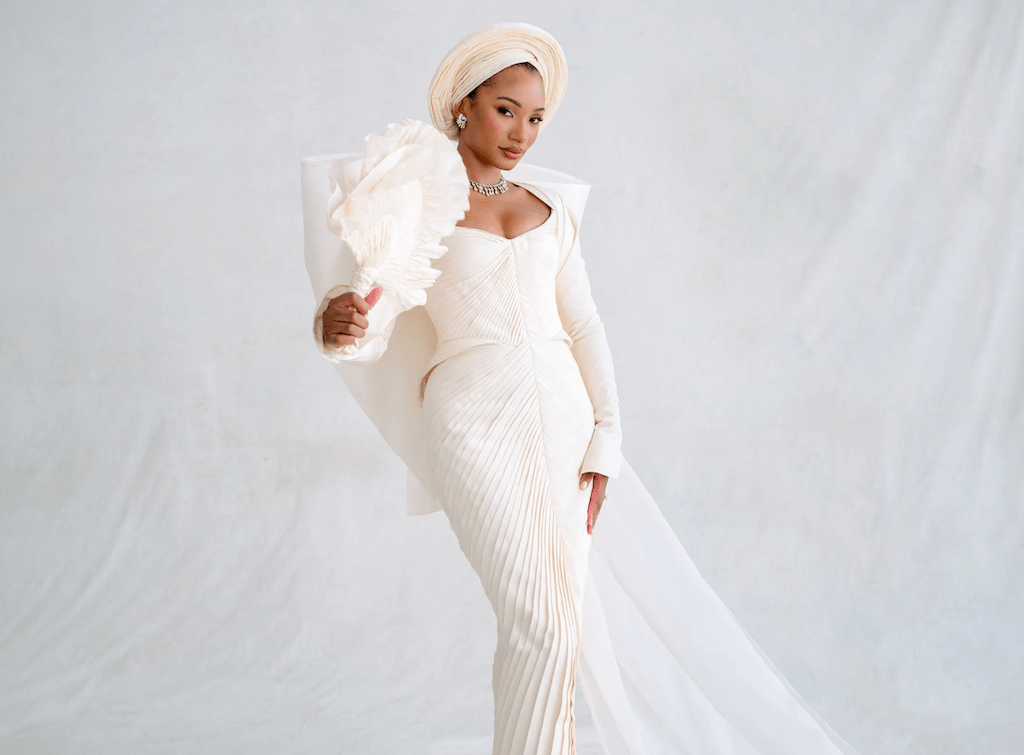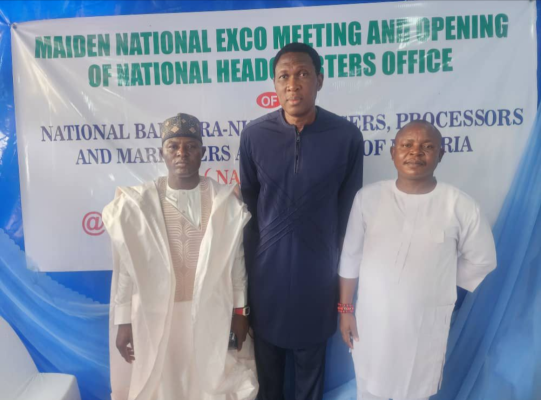
By NowahalaZone Editorial Team
Temi Otedola’s Wedding Gown Sparks Global and Local Fashion Debate
The vibrant photos from Temi Otedola’s—now Temi Ajibade—wedding to Afrobeats star Mr Eazi have sent waves through both Nigerian and international media. Dazzling in traditional Nigerian attire, much of which was reportedly custom made by designers including distinguished American couturier Zac Posen (Vogue, 2024), Temi’s looks ignited passionate discussions about the role of heritage, ownership, and the future of West African fashion—especially when it comes to who gets to interpret and profit from these iconic sartorial statements.
As soon as her images surfaced online, many social commentators quickly reacted to the prominence of non-Nigerian designers. Notably, this included celebrated global names like Zac Posen—better known for Hollywood red carpets than Yoruba iro and buba. Within hours, platforms such as X (formerly Twitter) were awash with commentary, ranging from admiration of the craftsmanship to pointed questions about loyalty and support for Nigerian creativity. As one X user bluntly stated: “Temi Otedola & Mr Eazi should have done their wedding in Nigeria to support Naija brands. Doesn’t make sense carrying that money to foreigners.” (Source)
Why the Outcry? Decoding Cultural Expectations
It’s not difficult to appreciate why many Nigerians feel invested in how their cultural attire is represented—especially by Temi, who hails from one of Nigeria’s most prominent families. Her status extends beyond celebrity; it’s symbolic. As analysts in Lagos note, whenever a figure of such influence makes personal choices about tradition, the ripple effects spread beyond style—touching questions of cultural pride, economic empowerment, and national prestige.
In a country whose creative sector is poised for greater global influence yet still struggles for structural support (reportedly, Nigeria’s fashion industry contributed over $4.7 billion to the GDP in 2023, according to the Nigerian Export Promotion Council), any move that appears to favour overseas creators over local talent is bound to sting. For many, the optics of exporting both the creative process and the profit felt like a deliberate redirection of visibility and resources at a time when “Made in Nigeria” is more than just a slogan—it’s a campaign for global relevance.
Fashion, Identity, and the Gatekeeping Debate
To critics, Temi’s decision was more than a personal preference. It symbolized, in their view, the migration of cultural capital—not just wealth—to the West. As Lagos-based cultural critic Chuka Eze said in a conversation with NowahalaZone, “Nigerian high society has always set the tone for what’s aspirational. If our own icons look outward for validation, what message does that send to emerging designers fighting to break through at home?” The question runs deep, especially in a nation where elites frequently blur the boundaries between private life, culture, and civic influence.
But there’s another side to this story, one that Temi’s wedding may have inadvertently highlighted. While the disappointment is understandable, her choice could also be read as a challenge—a call to Nigerian designers and the industry at large to evolve, think globally, and compete at an international level.
Beyond Borders: When Cultural Fashion Joins the Global Conversation
Underlying much of the backlash is an assumption that only Nigerian—or West African—designers should, or can, authentically create traditional apparel. Yet, as globalization accelerates, cultural symbols are increasingly interpreted, responsibly or otherwise, by outsiders. Zac Posen’s take on Yoruba dress, while controversial to some, was widely praised for its meticulous nod to tradition and his unmistakable signature finish.
According to Professor Funke Atunde, a lecturer at the University of Lagos, “Fashion is both artifact and dialogue. When Nigerian heritage is explored by global designers, it places our culture on the world stage, but it also tests the flexibility and creative muscle of our local industry.” She adds that such moments are double-edged: “While some fear dilution, it’s also an opportunity to assert our place within a borderless, creative economy.”
The New Playbook: Creativity, Not Just Heritage
Temi’s move signifies a crucial shift for Nigeria’s next-gen tastemakers. In an era defined by global streaming, Instagram aesthetics, and transnational pop culture, origin is just one factor—creative innovation, flair, and professionalism are what set designers apart in an increasingly competitive ecosystem.
If a Nigerian bride can confidently turn to a foreign designer to interpret Yoruba heritage, the invitation opens both ways. There’s nothing preventing, for example, a South Asian mogul from commissioning a Nigerian designer for a bespoke sari reinterpretation, or a Brazilian influencer from trusting a Lagos atelier with a twist on Rio’s carnival attire.
This cross-pollination offers West African designers the chance to step beyond the role of tradition-bearer and become genuine players on the global scene. Lagos-based stylist Tola Amusan summarized for NowahalaZone: “The world is getting smaller. If we want the world to embrace agbada, we must also be ready to recut kimonos, lehengas, and much more— always infusing the ‘Naija’ approach.” That, he argues, is the new test for staying relevant.
Can Nigerian Designers Meet the Challenge?
While Nigeria’s fashion export has surged in recent years, some observers claim that parts of the industry have grown comfortable relying on cultural familiarity and a domestic market. Yet, with global tastes evolving and international brands eager to join the African renaissance, being fluent in tradition is no longer enough.
According to Fola Olawale, a fashion consultant in Abuja, “Irreplaceability once rested on cultural monopoly—but that monopoly is over.” He explains that only those designers who master branding, international storytelling, tailoring finesse, and storytelling will stand out. The bar has been raised.
It’s not sufficient to simply say, “I can make agbada.” The real markers of success are, “Does the world want to wear it? Can you interpret Paris, London, Johannesburg, and Accra through an African lens? And, crucially, can you remix someone else’s tradition the way Posen reimagined ours?”
Towards a Borderless Fashion Identity
The lines between local and global, tradition and innovation, are blurrier than ever. Across the world, leading designers are fusing influences, reshaping stories, and using style to challenge old boundaries around identity. Nollywood stars sport Japanese motifs; South African pop artists reinvent Ankara. The energy is collaborative, not competitive—open to reinvention, dialogue, and even some controversy.
Rather than asking, “Why Zac Posen?” perhaps the better question is, “Which Nigerian creative will be the next Zac Posen for Japanese, Indian, or Brazilian couture?” If Nigerian designers demand the world’s respect for exclusivity, they must also be ready to give—competing and collaborating across borders, not just within them.
Temi Otedola’s wedding was no snub; it was an expansion. She broke the glass ceiling for what it means to honour, reinterpret, and globalize heritage. And she showed that distinctiveness, not birthplace, wins the day.
The Real Takeaway: From Gatekeeping to Global Gatecrashing
Temi’s bridal moment demonstrated that any designer—regardless of nationality—can interpret, respect, and even elevate a foreign culture, if they approach it with skill and humility. The days when ethnicity alone guaranteed business are behind us. Nigerian creatives remain essential to our identity and economy, but they now face real, global competition. That’s not a threat—it’s an invitation.
The era of closed borders and creative monopoly is fading. Today’s winners will be those who honour their roots but aren’t afraid to step onto the world’s stage, ready to learn, lead, and innovate.
https://www.instagram.com/tessyoliseh/?hl=en
Where do you stand on the debate about Nigerian designers, tradition, and globalization? Do you believe anyone, anywhere, should have the creative freedom to reinterpret cultural fashion— or should there be boundaries? Drop your thoughts below, and let’s get this conversation started!
Have a unique story, fashion perspective, or experience with African design you want to share or sell? We’d love to hear from you! Email us at story@nowahalazone.com to get your story featured or discuss your submissions.
For support or general feedback, reach out at support@nowahalazone.com.
Keep the conversation going by following us on Facebook, X (Twitter), and Instagram for more updates, style debates, and behind-the-scenes from across Africa.










